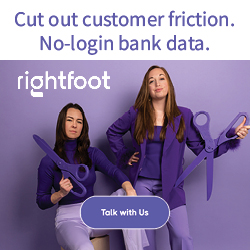Related Headlines
| 03/01/2024 | Big Think Capital appoints new CMO |
Stories
Think You’re Good at Closing Deals in the US? Apply Your Skills in the UK or Australia
November 10, 2022 Think you’re well-versed in the SMB finance business? You might want to take advantage of a fast pass being offered to replicate your success in the UK or Australia.
Think you’re well-versed in the SMB finance business? You might want to take advantage of a fast pass being offered to replicate your success in the UK or Australia.
The opportunity stems from a proposal posted on LinkedIn by Capify CEO David Goldin. Goldin’s got two decades of experience in the business itself and 14 specifically in the UK/Australian markets. Now he’s looking to personally select a handful of brokers and/or small funding companies and guide them on expanding their business overseas.
But why?
Goldin believes that US operators could bring a certain dynamic lacking in the other markets, complete dedication to a single product where there is a lot of opportunity. “There’s very few MCA shops there,” he said. “Very few of them that are MCA-only companies.”
 And so the dedicated MCA broker shop is something uniquely American and could prove to be a potent model if applied abroad. Brokers do play a major role in those markets but they’re a jack of all trades, Goldin explained, offering every product there is, resulting in limited throughput for a single core product. Markets like the UK and Australia offer some unique advantages in that they’re English speaking and the products themselves are already established. Goldin said that there’s an opportunity for US operators that “know how to sell risk-based capital” to come in and leverage the Capify infrastructure and intellectual capital.
And so the dedicated MCA broker shop is something uniquely American and could prove to be a potent model if applied abroad. Brokers do play a major role in those markets but they’re a jack of all trades, Goldin explained, offering every product there is, resulting in limited throughput for a single core product. Markets like the UK and Australia offer some unique advantages in that they’re English speaking and the products themselves are already established. Goldin said that there’s an opportunity for US operators that “know how to sell risk-based capital” to come in and leverage the Capify infrastructure and intellectual capital.
To be clear, he’s not talking about sitting in an office in New York or Miami and calling business owners in Sydney and London, but about actually opening up a local office in those markets.
“You got to have a local presence,” Goldin said. “A remote company doesn’t work. You need to actually be there.”
 All this would be set up and developed with the guidance of Capify, a benefit that would shorten the learning curve of doing business in a new market. “There’s a lot of stuff to navigate,” he said. “Different regulations, different rules, different clients.”
All this would be set up and developed with the guidance of Capify, a benefit that would shorten the learning curve of doing business in a new market. “There’s a lot of stuff to navigate,” he said. “Different regulations, different rules, different clients.”
deBanked first began exploring the Australian market in 2015. At the time, there were about 20 alternative lenders operating in the country. Since then the market has flourished. The population of Australia is only 26 million people, about two-thirds that of Canada, but Goldin said that it’s not as competitive.
“The US is bigger but also 50x the competition,” he said.
For anyone interested in this opportunity, the best way to contact him is through LinkedIn. The original post can be found here.
Is Your Big Brand a Bank? You Can Turn it into One
August 16, 2022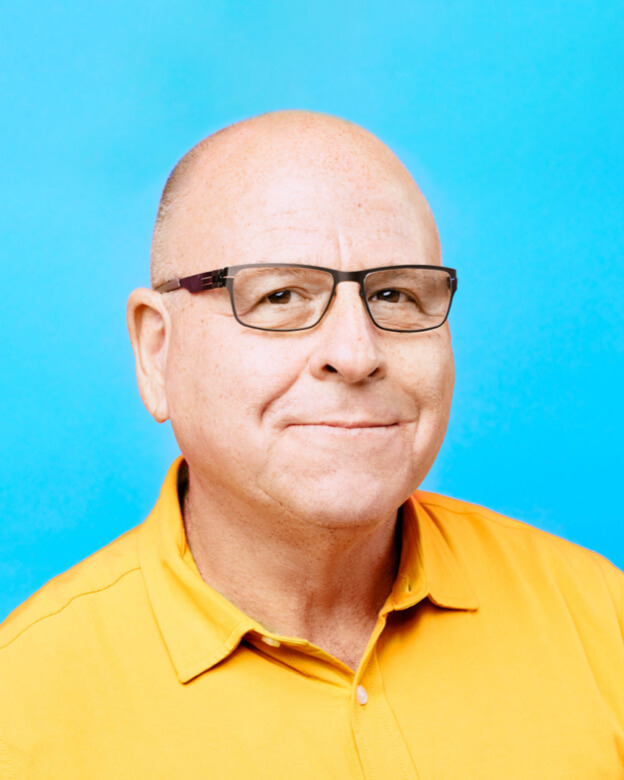
“Any entity that has employees, customers, and fans can create a banking infrastructure that looks just like a bank,” said Yuval Brisker, Co-founder and CEO of Alviere. Founded in 2020 as a spinoff of Brisker’s previous firm, Mezu, Alviere is ringing in the next generation of fintech through its embedded finance solutions.
Brisker wasn’t talking about turning the corner diner into a bank, but rather about providing the infrastructure to enable the largest companies and brands in the US to be one-stop shops for financial services, including banking.
“[It could look] like a bank in every sense,” he said, “FDIC insured, providing a savings account with yield, being able to ultimately give them a credit card, that is not a co-branded credit card, but it’s a single brand…”
Alviere has already spent loads of time dealing with the hard parts, building the tech, but also navigating the regulatory framework to make this concept a reality.
“We are a 100% regulated entity, meaning we’re not piggybacking on a banking license,” Brisker said. “We are actually licensed across the United States in every state that takes a license (except Montana). We are licensed with the federal government in Canada and Quebec and in the English speaking provinces, we’re in the process of completing our licensing in Mexico, and in Europe and in the UK.”
Brisker says this proactive approach is a “big differentiator” against the competition because they really want to provide the full services end-to-end. And that’s a big range given that it spans from bank accounts to payments to cards to cryptocurrency.
 In making this possible, partnerships are key. Alviere has multiple bank partners across the globe, the company claims, one among them being Community Federal Savings Bank in the US. Alviere even solidified a deal with Coinbase back in March that enables brands to provide crypto services to their customers all through their own branded technology.
In making this possible, partnerships are key. Alviere has multiple bank partners across the globe, the company claims, one among them being Community Federal Savings Bank in the US. Alviere even solidified a deal with Coinbase back in March that enables brands to provide crypto services to their customers all through their own branded technology.
Retail customers might not ever know the name Alviere because they remain in the background, Brisker explained. The brands would, but the customers would only see themselves interfacing with the brand, which is basically the whole point.
“We tell [brands] those customers will never be our customers,” Brisker said. “We’re never going to take over the customer relationship.”
Larger companies have probably entertained this whole idea at some point already, according to Brisker. The potential to capitalize on a loyal customer base by trying to offer them financial services is increasingly being looked at.
“If you’re one of those companies and you also look at the same time how difficult it is to get into this business, both from a regulation, an ecosystem, and a technological point of view, then you’re probably putting that on your back burner and saving this for another day,” he said. Alviere, however, can make this a reality right now.
“We have all the contracts, we have all the relationships, you just need to have one point of contact, one API, one relationship, one contract, and that’s us,” Brisker said. “And we take care of everything else.”
But perhaps it’s all a big bet, because would customers actually use financial services offered through non-bank brands that they’re fans of otherwise? Technically, they already are.
When Alviere launched two years ago, more than 1 out of every 2 Americans had already used a Buy-Now-Pay-Later (BNPL) service, an embedded financial concept that’s taken off around the world. BNPL sales amounted to $100 billion in 2021 in the US alone.
“We believe that there’s a huge opportunity for more traditional beloved and essential brands to become the financial service providers for [people] coming of age,” Brisker said. “And then of course there’s a huge unbanked population that for whatever reason has not entered the financial system here and abroad, which we think that through the affinity with sort of less foreboding, less anxiety, stress-ridden relationships like some people have toward banks that they will be more inclined to come into the financial system through the back door of the system, the front door of the brands they already know and patronize.”
The Biggest Expansion Period of Our Lifetime? The Non-Bank Finance Industry Says Full Steam Ahead
July 8, 2021 Erez Stamler, Managing Director of Fresh Funding, said that the events of the past year has been an up and down ride, from the initial shutdown shock to rushes in demand. Now that the world is back, those that survived are here to stay and need capital to grow.
Erez Stamler, Managing Director of Fresh Funding, said that the events of the past year has been an up and down ride, from the initial shutdown shock to rushes in demand. Now that the world is back, those that survived are here to stay and need capital to grow.
“At first the system was in shock, then a phase where we saw a strong spike in submissions [where] the owners were probably looking for some sort of PPP-type solution, and that was not available by us,” Stamler said. “Going into 2022 we believe there’s a lot of demand out there. A lot of businesses have demonstrated growth during Covid and hopefully will continue that into 2022. As far as we can see right now, we’re going strong this year for sure.”
Alex Vasilakos, who tracks online interest in alt finance as the director of marketing for Finance Marketing Group, said there had been an increase in online searches for non-bank financing solutions in the past year because banks weren’t sure how the pandemic would pan out.
“We are back in the office, and we are seeing a large uptick in digital advertising since Covid, and it is continuing to increase,” Vasilakos said in an email. “I am seeing and predicting that people will be leveraging more online sources for financing than they have in the past.”
Amotz Segal, a startup co-founder of Edge Funder, said that if the Covid spikes and black swan events are over, there is no limit to demand, and the hybrid model is here to stay. Edge Funder uses lead generation and AI underwriting to make SMB deal-making easier, Segal said.
“I think nobody’s really bullish enough, I think we’re facing the beginning of the biggest expansion period of our lifetime,” Segal said. “Our team based in New York City will hopefully gradually go back to the office this fall. That being said, I don’t think that we will ever see a one-hundred percent office-space environment. I think what the pandemic did is accelerated a trend that already began of people working from home, working remotely, and not having to attend the office daily.”
Segal has grounds to be bullish: Edge was just acquired by Yes Lender after only a year of development.
 James Lee, CEO and co-founder of Julius Technologies, said that people had definitely gotten a feel for remote work, but virtual does not replace in-person communication. Julius is a startup that creates cost-effective back-end infrastructure for fintechs, building efficient data analytics for credit underwriting.
James Lee, CEO and co-founder of Julius Technologies, said that people had definitely gotten a feel for remote work, but virtual does not replace in-person communication. Julius is a startup that creates cost-effective back-end infrastructure for fintechs, building efficient data analytics for credit underwriting.
“We will see some shift. People got a taste of what it’s like to work from home; the hybrid model is a possibility in the short term,” Lee said. “In the long term we’ll see if Covid comes back in the fall with people working closely together. Hybrid works, but face-to-face time is irreplaceable and very difficult to replace in a virtual sense.”
Lee said that in-person interaction is vital for networking, mentorship, and even random, spur-of-the-moment conversations that bring a team together. Lee recently completed the Techstars incubator program fully virtually. Everything but launch day was virtual in a process that is usually hands-on.
Some firms are back in the office full time. Samuel Yakubov, director of ISO Relations at Maverick Funding, said he was already working in the office in June and had high hopes for 2022.
Tyler Deters, president and CEO of Paradigm Equipment Finance in Utah, said his business was back indoors and on track.
 “We are optimistic for the future,” Deters said. “Our staff has all returned to the office, and we are full steam ahead.”
“We are optimistic for the future,” Deters said. “Our staff has all returned to the office, and we are full steam ahead.”
Joe Lustberg from Upwise Capital couldn’t agree more and said his team had been working in the office through the shutdown. Lustberg is confident that the post-pandemic world will be great for business, and Upwise has been doing well servicing PPP, equipment and trucking financing, and niche cannabis industry funding. Upwise also took advantage of the dip in real estate to snag an office in Manhattan and “never looked back.”
“We made sure that everybody was vaccinated, and before the vaccination was available we were still in the office. We were getting tested monthly and my guys had the option to work from home,” Lustberg said. “To be honest, most of them want to be around the company culture, the show floor. It’s much easier for them to walk in my office and ask me a question than FaceTime. It’s good New York is coming back.”
Six or seven months ago, it might have been a market full of PPP loans, but MCA is coming back strong, Lustberg said. With government funds exhausted, he said even firms that had never taken an advance before are looking for funding.
Steven Hunter would agree the industry is back. As a consultant that works best coaching underwriting teams in person, however, the work from the home model has been a drag. He said hybrid may work for relaxed work environments, but to get ahead, in-person is the way it has always been and always will be.
“I think the fact that we have proven we can, in most situations, work remotely has made [funding shops] think: ‘well you know airfare, hotel, meals and Ubers.. you know it adds up.’ So, I think I think a lot of people are going to be cost-sensitive to travel in a way they weren’t before,” Hunter said. “But if you want to make it in this industry as a startup funder, and you want ISOs to give you deals, you cannot do that by the phone and you cannot do that via Zoom call. You have got to show respect for the good shops.”
Hunter said in the actual MCA business, you don’t win deals by calling them 100 times. You get deals from the best of the best by selling face to face.
“You get deals from [top brokers] by putting your ass on a plane and flying into LaGuardia, taking a cab to their office and camping out there for three days, and talking to them looking them in the eye and saying this is what I’m going to do for you,” Hunter said. “Sales is always going to be boots on the ground. You got to put people out there.”
National Business Capital & Services Expands into Cannabis Funding with CannaBusiness Financing Solution
October 15, 2019 Today National Business Capital & Services (NBC&S) announced it has begun serving cannabis companies. Through its new program, CannaBusiness Financing Solution, NBC&S is now accepting applications for loans starting at a minimum of $10,000 from firms in the industry that are over one year old.
Today National Business Capital & Services (NBC&S) announced it has begun serving cannabis companies. Through its new program, CannaBusiness Financing Solution, NBC&S is now accepting applications for loans starting at a minimum of $10,000 from firms in the industry that are over one year old.
“The CannaBusiness Financial Solution will allow business owners to seamlessly obtain the capital they need, and allocate funding toward either hiring new employees, purchasing inventory, marketing strategies, or any other business need right away, without government regulations hindering growth opportunities or having to give up equity,” explained NBC&S President Joseph Camberato. “We’re not a bank and the lenders we work with aren’t banks either, so it falls into a different area of commercial lending.”
CannaBusiness is available in the 33 states where cannabis is legal, be it for medicinal or recreational uses, as well as in Canada.
“It’s a rapidly growing space, no pun intended,” joked Camberato when asked about the differences in funding cannabis companies compared to the industries NBC&S has served in its 12 years of business. “It would still be underwritten, just like one of our normal businesses. But we’re definitely going to want to know a little bit more about the business and understand what exactly they’re doing, how they’re operating, and exactly what are they’re focused on.” They’ll also examine if the business is in compliance with state laws. Qualifying cannabis companies must be in business for at least 1 year, with a minimum of $10K in monthly revenue. There is no minimum FICO score requirement.
 While it’s not the first funder for cannabis companies, NBC&S views the move as a step in the right direction to “get ahead of the curve” according to Camberato. “We’re living through a modern-day prohibition, I think in 20 years we’ll look back on it and talk about it with our grandchildren and be like, ‘wow’ … I don’t think people realize how big of a deal this really is, but it is a business and it is another industry that has bloomed in front of us, again no pun intended. I think it’s fascinating that we get to witness this and that we’re really at the forefront of it and helping folks get the funds they need to grow.”
While it’s not the first funder for cannabis companies, NBC&S views the move as a step in the right direction to “get ahead of the curve” according to Camberato. “We’re living through a modern-day prohibition, I think in 20 years we’ll look back on it and talk about it with our grandchildren and be like, ‘wow’ … I don’t think people realize how big of a deal this really is, but it is a business and it is another industry that has bloomed in front of us, again no pun intended. I think it’s fascinating that we get to witness this and that we’re really at the forefront of it and helping folks get the funds they need to grow.”
Jumping off from the politically charged word of ‘prohibition,’ NBC&S’ Vice President of Marketing, T.J. Muro, noted that he believed cannabis legislation to be one of the few issues that can be bipartisan, saying, “Out of everything today in our political climate, I think it’s the one thing that has unified people in the political parties. The liberal side appreciates the cultural influence and significance there, and then on the more conservative side it’s the tax revenue.”
The upcoming Senate vote on the SAFE Banking Act will put this theory to the test. The bill, which would allow the cannabis industry wider access to banking, has already passed the House.
BFS Capital Announces New CEO
November 28, 2018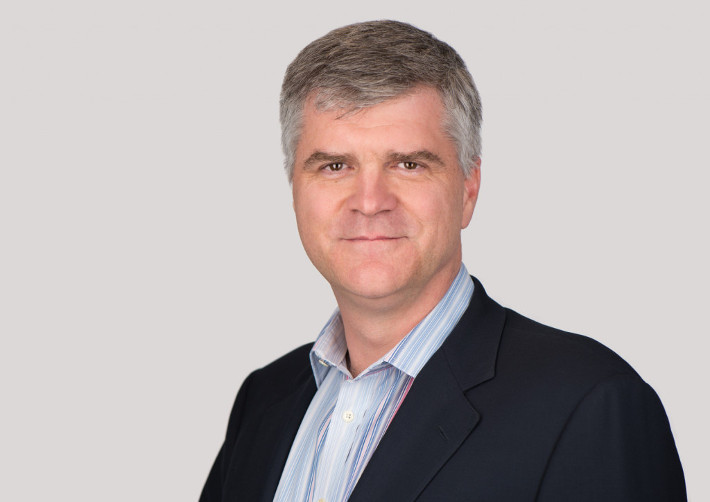 BFS Capital announced today that it has appointed Mark Ruddock as CEO, effective immediately. Co-founder Marc Glazer, who has served as interim CEO since the departure of Michael Marrache earlier this year, will be Chairman.
BFS Capital announced today that it has appointed Mark Ruddock as CEO, effective immediately. Co-founder Marc Glazer, who has served as interim CEO since the departure of Michael Marrache earlier this year, will be Chairman.
“I sense there is tremendous potential in this firm,” Ruddock told deBanked. “It has in its DNA an innate understanding of the needs of small business and I think the opportunity for it is to leverage significant increases in data science and technology to help scale and deliver on this potential.”
Most recently, Ruddock served as interim CEO for nearly two years at 4finance, one of the largest European consumer focused online lenders, with more than 3,000 employees and customers across 17 countries. Ruddock said that at 4finance, every day they would issue more than 16,500 loans and make about 22,500 risk decisions. And the entire process was automated.
“There is an opportunity to achieve real scale [in small business lending] through the use of leading edge technology,” Ruddock said, and that is what he intends to do at BFS Capital. Ruddock is relocating to Florida from Berlin, Germany.
Glazer will remain a key part of the operations at BFS Capital.
“One of the biggest assets this company has is Marc Glazer,” Ruddock said. “The two of us see this very much as a joint endeavor moving forward…and I’m going to hold him to remaining actively involved here.”
Their offices are right beside each other, Ruddock said.
“[Ruddock] has an outstanding track record of transforming financial services and technology companies by accelerating their innovation and business growth,” Glazer said. “His diversity of experience, from founder to growth stage executive, across a wide variety of industries and geographies makes him an exceptional choice for BFS Capital at such a pivotal stage in our evolution.”
Ruddock was the founder and CEO of INEA Corporation, an enterprise software firm focused on the financial services industry that was acquired in 2005. Following INEA, he became CEO of mobile software company Viigo, whose flagship app became one of BlackBerry’s most downloaded apps of all time by the time the company was acquired by RIM (Blackberry) in 2010. He held a number of other positions before becoming interim CEO at 4finance in 2017.
Headquartered in Coral Springs, FL, BFS Capital funds American and Canadian small businesses with merchant cash advances and business loans. Through its affiliate, Boost Capital, the company also provides funding to small businesses in the UK. Since 2002, BFS Capital has funded more than $1.9 billion. The company also has offices in New York, California and the UK.
Hard Work, Big Success – The True Story of an MCA Broker
December 15, 2017Sales is a tough field for anyone to break into even if they come from the most ideal of circumstances. At some point, the rubber meets the road for every MCA broker, at which time they must decide whether they’ve got what it takes to make it in this business.

This is what makes Lerry Dore’s story so remarkable, as it seems that the more he got knocked down in life, the higher he was destined to rise. Today he’s employed as an MCA broker at Cresthill Capital. And while education has been paramount to getting him here, evidenced by the fact that during his entire employment he has been in college and he is still one of the funding company’s most successful brokers, Dore more than anything else was trained at the school of hard knocks.
Coming to America
Dore was born in South Florida, but he wouldn’t stay in the United States for long. After his parents split up, his mom was having a tough time making ends meet and made the impossible decision to send him to Haiti to live with extended family.
“My mom had a very hard time supporting us right out of the gate. Soon after I was born, I was sent to Haiti to live with my aunt and cousins,” he said, adding that this gave his mom a chance to get on her feet. “She needed to get a job so that she could provide for us at a basic level.”
Dore would remain in Haiti for the first three years of his life, where his first language would become Haitian Creole. But you wouldn’t detect a hint of an accent talking to him today at the age of 23.
Dore’s mom eventually found a job. She was only earning minimum wage at a hospital, but it was enough to get the wheels in motion to bring her son home.
“She was in a position to provide food, electricity and shelter for us. That’s why I came back,” said Dore, adding that he doesn’t remember much of Haiti with the exception of the plane ride home. “That’s where my memories start,” he said. Perhaps it was somewhere over the Caribbean that young Dore’s dreams began to form.
When he got back to Florida, Dore was able to meet his mom for what felt like the first time for him. He also met his brothers and sisters for the first time ever. He explained how at this point, his mom was still getting adjusted to life in America as an adult immigrant.
 “There were a lot of things that I went through as a kid to this point that she couldn’t give me guidance on. She simply didn’t have that experience. That brought a challenge,” he said. Little did he know that these obstacles would help shape him into the resilient person and successful MCA broker he is today.
“There were a lot of things that I went through as a kid to this point that she couldn’t give me guidance on. She simply didn’t have that experience. That brought a challenge,” he said. Little did he know that these obstacles would help shape him into the resilient person and successful MCA broker he is today.
While getting used to the American culture was a challenge, something that his mother never lost sight of was the importance of education. “She was very big into education,” he said. Dore’s mom discovered Head Start, a government subsidized program that provided a pre-school education for families who couldn’t otherwise afford it. That was where it would all begin for Dore, and come hell or high water his mother was going to enroll him. Without the luxury of an air-conditioned vehicle to drive in the hot Florida heat, the pair set off on foot to sign up. Some 12-15 blocks later they arrived.
“Both of us were sweating bullets. She didn’t know it, but there was a small registration fee. At the time, she didn’t have it,” Dore explained. It was then that fate seems to have stepped in in the form of the woman who was handling registration. She pulled the pair aside and told them that after witnessing the dedication that this mother had toward her son, she was going to waive the fee. In return she only asked that they keep it on the down low.
“That small gesture made a dramatic difference in my life,” Dore said. “If I was not able to attend, I wouldn’t start school until I was seven or 10 years’ old. That was a very important moment in my life.”
Indeed, it was, as it would set in motion a series of events that would lead Dore to where he is today, a successful MCA broker at Cresthill Capital. But before he would join the firm, there were still more hardships waiting for him, not the least of which was the death of a friend in his teenage years. “That could have been me,” Dore exclaimed.
For the average person, life’s setbacks could have held them down forever. For Dore, they seem only to have propelled him further. “The reason why I stayed out of trouble was I was in school and my mother kept us grounded,” he said.
During his teenage years, Dore and his family lived in an apartment complex in a neighborhood of immigrant Haitians where he said the median income was $25,000 to $30,000 per year. He shared a room with his brothers and sisters.

“I focused on athletics,” he said, adding: “That’s where I got my competitive nature. Also, my thick skin,” both of which, incidentally, are characteristics that would serve him well as a broker later in life.
While he excelled at basketball at his Boca Raton high school, Dore wouldn’t be able to pursue those dreams for long. He and his family would be uprooted from their home time and time again amid landlord trouble. This series of setbacks, which involved him sleeping on his brother’s couch for a time, instilled a sense of maturity in Dore at a very young age.
He had a few Division II and Division III offers to play basketball in other states, but he turned them down. Instead of chasing his own dreams, Dore decided to focus on business and find a way to sustain and support his family “Once I graduated, I was not interested in basketball. I wanted to finish college,” said Dore, and lucky for the MCA industry he had his sights set on the field of finance.
Funding Merchants
After High School, the first thing that Dore did was to go online and look for a job. As it so happens, the first ad he saw was at a stock brokerage in Boca Raton. “That’s where I started, in phone sales. I didn’t have a Series 7 license at the time. I was just calling from the Yellow Pages. Once I got someone on the phone, I would transfer the call to someone who had a license,” he explained.
This went on for a couple of months until he heard about a startup company in nearby Delray Beach. “At the time, they were prospecting merchants. That’s how I got into the industry,” he said.
 His first job in the MCA niche was with a very small ISO shop. But it was there that he would make a connection to change the course of his career. He was working on a deal that was hard to place and was only getting rejections. That is until he came across Mike Daniels, Cresthill’s No. 1 producer.
His first job in the MCA niche was with a very small ISO shop. But it was there that he would make a connection to change the course of his career. He was working on a deal that was hard to place and was only getting rejections. That is until he came across Mike Daniels, Cresthill’s No. 1 producer.
“I couldn’t get the deal done anywhere else. The merchant was getting frustrated with the process. I heard of a company that takes chances on merchants with imperfect credit,” he said. That funder was Cresthill Capital. Little did he know at the time, but they would eventually become his employer.
He sent the merchant file over to Daniels, who then reached out to the merchant and got the deal funded. It was at that point, Dore said, that he started to fall in love with Cresthill “because of how [Daniels] was able to treat the merchant with respect and get the deal done.”
For the next six months, Dore would proceed to trust all of his business with Cresthill. He was still employed by the small ISO shop, but he began to outgrow his environment and long for a platform that allowed him to explore his talent and excel. But his pursuit only left him frustrated and thinking about leaving the MCA industry, something he confided in Cresthill Capital’s Daniels, who was turning into a mentor, about.
It was at this point in his life and career that instead of being the rock, Dore needed to lean on someone else. Daniels and Cresthill Capital were there for him. He was invited in for an interview, and as they say the rest is history.
“I was shocked at how diverse the workforce is. There were different types of people with different backgrounds. I liked it right off the bat. And then everyone was very friendly to me from the moment I walked in,” he said. He was greeted at the front door by Cresthill Capital’s Mike Marano, who then proceeded to interview him.
 “I’ve actually interviewed and sat with every single person at my company and hired them personally. What I can say about Lerry is that from the moment I looked at his face and saw his eyes, I knew intuitively that he was a good person. And responsible. I had no idea how deep of a person he was, how much humanity he would show. He was a willing student, and we were happy to teach him. And he continues to soak it up like a sponge,” Marano told deBanked.
“I’ve actually interviewed and sat with every single person at my company and hired them personally. What I can say about Lerry is that from the moment I looked at his face and saw his eyes, I knew intuitively that he was a good person. And responsible. I had no idea how deep of a person he was, how much humanity he would show. He was a willing student, and we were happy to teach him. And he continues to soak it up like a sponge,” Marano told deBanked.
Dore was convinced Cresthill Capital was the right place for him when Marano insisted that Dore stay in school and continue his education. “They said, ‘we will work around your schedule,’ and that really drew me in,” he said, adding that the dog-friendly environment was a bonus.
Dore has been employed by Cresthill Capital for the past 18 months and is graduating from college this week. He is not only supporting himself, but he’s the highest earner in his family, which has allowed him to help support them.
Paying it Forward
As if on cue from the mystery lady that paid his school tuition when he was just a child, Dore is now interested in paying it forward in life. He said that similar to how Cresthill Capital is involved with philanthropy, he’d like to give back to the community. But his vision goes beyond his neighborhood.
“I want to help kids that are similar to me, who are in programs that try to help them excel in this country. I want at some point to work with immigrants that come in from Haiti and work with them to give them a platform, like the lady who gave us a chance,” said Dore.
Since the Haiti earthquake, his extended family has relocated north to Canada. “But I still feel to some degree a responsibility to try and help out the people in that country and the ones who come here through immigration,” he said.
As for Marano, he said all Dore needs to do is exactly what he’s been doing. “When he leaves me, he won’t have to work again. But knowing this kid, he probably will anyway,” Marano said.
Kabbage’s Petralia Talks Big Tech, Fintech and Lending
October 2, 2017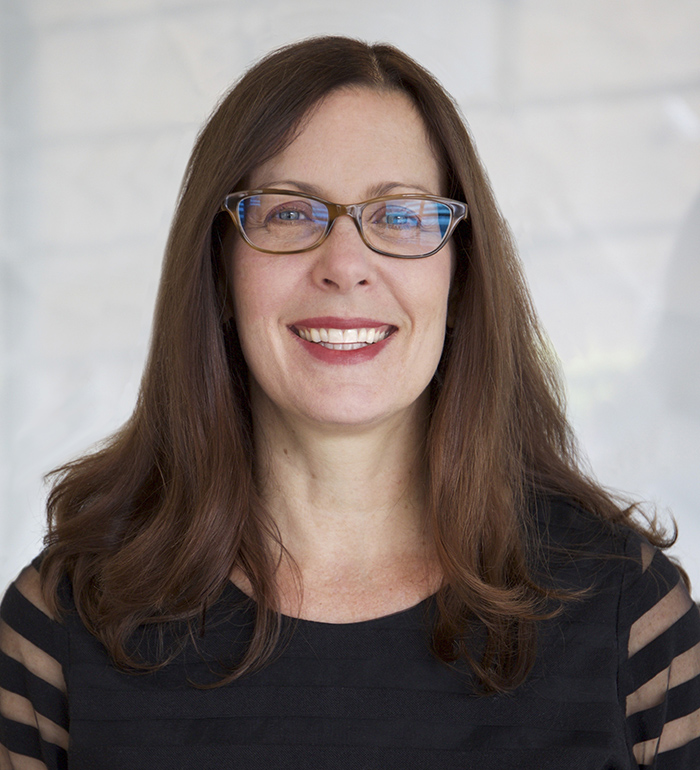 Kabbage co-founder and head of operations Kathryn Petralia was in New York last week for The Economist’s Finance Disrupted 2017 conference where she was a panelist on in an Oxford-style debate about whether tech giants Alibaba, Amazon, Apple, Facebook and Google pose a greater challenge to traditional banks than the fintech startup community. Her position is that no, they do not, and there appears to be room for both.
Kabbage co-founder and head of operations Kathryn Petralia was in New York last week for The Economist’s Finance Disrupted 2017 conference where she was a panelist on in an Oxford-style debate about whether tech giants Alibaba, Amazon, Apple, Facebook and Google pose a greater challenge to traditional banks than the fintech startup community. Her position is that no, they do not, and there appears to be room for both.
“Fintech can be anywhere. Alternative lenders, whatever you want to call them, I think they’re disrupting the space but not by trying to put people out of business. In our case we make loans to small businesses, but these are folks that are having a hard time borrowing from banks. So, we’re not taking business from banks. We’re drawing the circle a little bit bigger around access to capital.”
It’s only been a few weeks since the blockbuster announcement that SoftBank is investing $250 million into Kabbage, which thrust the small business lender into the spotlight for a few reasons, not the least of which was the more than $1 billion valuation that has been speculated for Kabbage.
This valuation, of course, is in stark contrast to that of OnDeck, which also lends to small businesses. As Petralia points out, however, OnDeck is a very different company than Kabbage and in fact not a very good comparable at all. For instance, Kabbage has never turned to brokers to find customers, and their application process has been fully automated since day one. She highlighted other differences too.
 “All of our bank partnerships are technology integrations where our technology sits in their systems. They use our technology to deliver the customer experience. And I think what SoftBank saw in us was that potential. Whatever the valuation was I can assure you it was a result of a lot of due diligence on the part of SoftBank,” she said.
“All of our bank partnerships are technology integrations where our technology sits in their systems. They use our technology to deliver the customer experience. And I think what SoftBank saw in us was that potential. Whatever the valuation was I can assure you it was a result of a lot of due diligence on the part of SoftBank,” she said.
SoftBank may now be sitting on Kabbage’s technology but they’re also sitting on a vast treasure trove of customer data that Kabbage may gain access to in the future.
“Certainly, that’s something we’re interested in and that’s something they talked with us about. They have a lot of access to a lot of businesses in global markets certainly in Asia including Japan and India, so I think we’ll see more relationships forming from that alliance over time,” said Petralia.
And the SoftBank deal seems to support Kabbage’s ambitious expansion plans. “We always thought we would be in almost all of the global markets five years from now. SoftBank is a continuation of our strategy for growth.”
As Kabbage pursues its aggressive growth strategy, it’s hard to ignore some of the headwinds other industry players have experienced.
“I don’t think anyone’s immune to macroeconomic changes and changes to access to the debt markets. Our focus is on technology automation from the beginning, and I think that gives us an advantage in the way we manage our customer base. Debt investors can see it, the ratings agencies can see it. One problem with a lot of the lenders is that they’re not able to access the debt markets because there’s not enough history or their portfolios haven’t performed the way they need,” said Petralia, adding that Kabbage has had the benefit of time on its side.
Kabbage’s vision is to “dynamically deliver products that small businesses need to run their businesses and to stay connected to the data that drives the underwriting process for lines of credit,” Petralia says, adding: “This could be growth capital and it could be other products and services that work around small businesses, whether it’s data processing or insurance or payments, any of those things. We want to deliver big business tools to the little guys.”
In terms of customer interest rates, everybody would rather have a lower rate Petralia says, but customers in their ROI equation know they will be able to generate more revenue to offset that. And Kabbage doesn’t require small businesses put up any collateral, which is what a bank would require them to do.
Kabbage’s Culture
Meanwhile in addition to industry headwinds some funders have experienced company-specific issues that had more to do with internal culture than any macroeconomic influence.
“From our perspective, culture is incredibly important. We were No. 16 for Glassdoor reviews for mid-sized businesses and that’s because employees really enjoy working here. If I had to characterize our culture with one term I’d say connected – our employees are connected to one another and to our customers. There is transparency and trust and a culture of caring deeply about one another. That’s really important to us,” said Petralia.
As for future growth avenues for Kabbage, there’s a lot of stuff in the works none of which she was at liberty to discuss.
LendingPoint: CAN Capital’s Close Neighbor in Kennesaw
August 14, 2017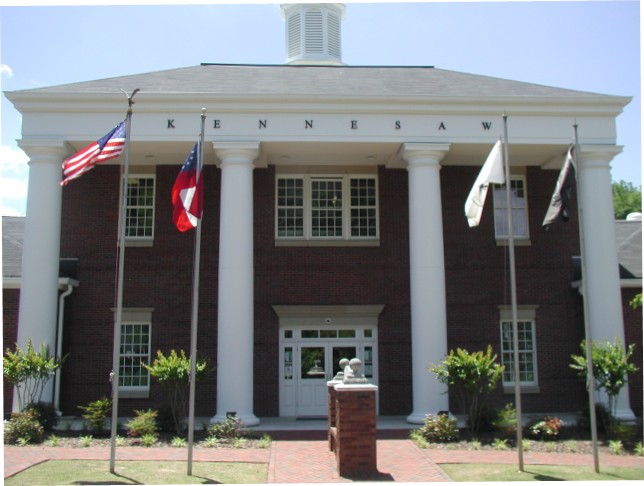 LendingPoint, a consumer lender staffed largely by former CAN Capital employees, may have something to teach the alternative small-business finance industry about creditworthiness. Three-year-old LendingPoint claims to go beyond FICO scores to bring each applicant’s sense of fiscal responsibility into sharper focus.
LendingPoint, a consumer lender staffed largely by former CAN Capital employees, may have something to teach the alternative small-business finance industry about creditworthiness. Three-year-old LendingPoint claims to go beyond FICO scores to bring each applicant’s sense of fiscal responsibility into sharper focus.
But first, let’s examine the CAN Capital connection. Four or five members of LendingPoint’s top management team came to the company after lengthy tenures at CAN Capital, a LendingPoint official says. That includes Tom Burnside, LendingPoint’s CEO and founder, and Franck Fatras, the company’s president and chief operating officer. Both worked 13 years for CAN Capital, with Burnside leaving as chief operating officer and Fatras departing as chief technology officer, according to biographies posted online.
All told, about 30 of LendingPoint’s 100 or so employees – a total that includes outsourced positions – formerly labored at CAN Capital, according to Fatras. Many put in considerable time at CAN Capital, holding jobs there in management, corporate governance, legal affairs, risk, sales, operations, IT, marketing, analytics, design, customer service, partner success and success delivery, online reports say.
Geography no doubt encourages CAN Capital employees to consider LendingPoint when it’s time to move on to another job. Both companies maintain headquarters in office parks in the Atlanta suburb of Kennesaw. In fact, the two companies operate half a mile apart, both of them just off of Cobb Place Boulevard Northwest, according to Google Maps and Directions.
Great news! Our new logo has OFFICIALLY made it's mark on our new building. What do you think?#Finance #LendingPoint #Logo pic.twitter.com/cpUIQvLy2w
— LPLoans (@LPLoans) March 13, 2017
The way Fatras tells it, LendingPoint hasn’t raided CAN Capital’s workforce. “We post the job, and they end up responding,” he says. “When they’re known quantities and people we have a lot of respect for, we just end up making it work.”
Moreover, LendingPoint’s connections with other companies don’t begin or end with CAN Capital. Some of the people in top management met when they worked at First Data Corp. and Western Union, Fatras recalls. Juan E. Tavares, co-founder and chief strategy officer, and Victor J. Pacheco, chief product officer, came from those relationships, he says.
Regardless of where they became acquainted, Lendingpoint’s leadership team has come together to form a direct balance-sheet consumer lender specializing in what they call a “near prime” clientele. The company defines the phrase “near prime” to include personal-loan applicants with FICO scores from 600 to 700, Fatras says, adding that the segment’s not sub-prime and not prime. The company has even trademarked “NEARPRIME” as a single word in capital letters, and it appears that way on the company website. It regards those consumers as “deserving yet underserved,” Fatras notes.
To qualify those applicants for credit, LendingPoint considers “behavior,” such as work history, education, and timeliness with paying rent, utility bills and cell phone bills, Fatras says. “A lot of what we do is identify patterns,” he says. “It’s all about asking the right questions.” The process requires tapping into multiple sources to collect the data, he observes.
 In a blog published online soon after LendingPoint was launched, executives Burnside and Tavares claim that most credit models search for ways to say no to applicants, while their company uses big data to find ways of saying yes. LendingPoint algorithms predict risk with great precision, they say.
In a blog published online soon after LendingPoint was launched, executives Burnside and Tavares claim that most credit models search for ways to say no to applicants, while their company uses big data to find ways of saying yes. LendingPoint algorithms predict risk with great precision, they say.
In a newspaper opinion piece that ran about the same time, Burnside and Tavares maintain that their model examines cycles in an applicant’s life to pinpoint upward and downward trends. A consumer on the way up deserves a loan, according to the theory.
The company’s willingness to study information that resides outside credit scores did not originate with the CAN Capital connection, Fatras says. “The model is unique and the data structure we are using is unique,” he says. “It’s all about understanding the credit story of the person.”
Latin American lending practices had some influence on LendingPoint, Burnside and Tavares write in one of their editorial pieces. Lenders there review factors other than credit scores because the scores aren’t readily available in some countries, they write.
To analyze that type of non-FICO information, LendingPoint has developed its own internal scoring model and then automated the process, spending a lot of time to develop the technology, Fatras continues. Once again, asking the right questions determines the meaning that the company can extract from the data, he emphasizes. Otherwise, the information’s just not that beneficial, he says.
When consumers come to the LendingPoint website and answer five or six questions, they can receive a firm offer of credit in an average of seven seconds and sometimes as quickly as four seconds, Fatras maintains. The offers are contingent upon the company underwriting department’s validation of income and other figures, ne notes, adding that “we’re pretty happy with the infrastructure we’ve built.”
LendingPoint collects on the loans with automatic payments from customers’ savings or checking accounts twice a month, according to the company website. Deducting the payments twice a month helps customers with budgeting, the site says. Consumers can borrow up to $20,000 and pay it back in 24 to 48 months.
The system was devised by top management with combined experience of more than a century in credit and risk, Fatras says. When those executives with so much commercial lending experience gather around the conference table to talk about the business, the possibility of lending to small businesses occasionally comes up in the conversation.
But Fatras doubts the company will make that move to the commercial side anytime soon because companies in the alternative small-business finance industry are competing for 5 million to 6 million potential customers while the country has 50 million near-prime consumers. “The space is so big where we are,” he says. “The demand could be over a billion dollars a month. We have a lot of room in front of us for growth.”
With that seemingly infinite market, LendingPoint has been growing at a healthy pace, Fatras says. The company, which was self-funded for the first year, made its initial loan in January 2015. In 2016, it did $150 million in business, he notes. By the middle of this year, the company had made a total of $250 million in loans to 25,000 consumers, he says.
It’s a business model that members of the alternative small-business finance community might do well to emulate, Fatras suggests. “There could be a lot of cross-pollination,” between consumer and commercial loans when it comes to going beyond FICO, he says.
LendingPoint executives that were formerly at CAN Capital
Tom Burnside, CEO
formerly a COO and president at CAN
Franck Fatras, President and COO
formerly a CTO at CAN
Mark Lorimer, Chief Marketing Officer
formerly a CMO at CAN
Dave Switzer, Chief Analytics Officer
formerly a VP at CAN
Joe Valeo, EVP of Strategic Development
formerly an EVP at CAN

Equipment Financing... big think capital, rdm capital funding and mateo capital group. , , if you know any other funders that offer equipment financing please post below. , , thank you.... |




























